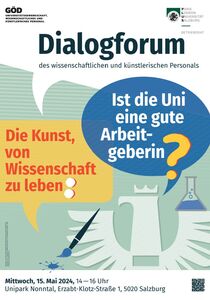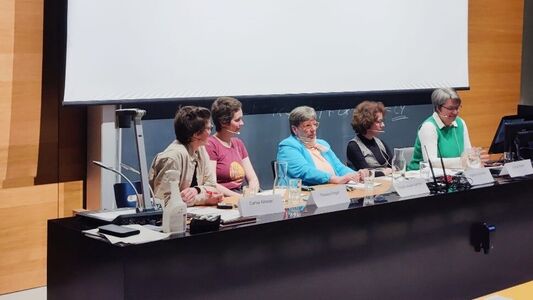BL13-News 02/24
Information by the University Union
The Federal Executive Board 13, BL13 for short, of the University Union which represents the academic and and artistic university staff wihtin the Public Service Union (GÖD) is pleased to announce the program of the third Dialogue Forum on May 15 2024 in Salzburg. In this second issue of BL 13-News we also cover current topics: We address the Minister of Science´s announcement of quotas on fixed-term contracts starting in the fall and reiterate our positions on the issue. In addition, we look at a recent study on the employment situation and working conditions at the University of Vienna and, finally, report on an event by the Regional Board of Upper Austria on the increasing competitive pressure on universities . We look forward to your feedback via e-mail to redaktion.bl13symbolgoedpunktat! |
The Art of Making a Living in Academia: Are Universities Good Employers?
Dialogue Forum, May 15th 2024

While the first Dialogue Forum addressed the systemic problems surrounding Section 109 of the Universities Act and the second dealt with the knock-on effects of chronically underfunding public universities, we now turn to the question of whether Austrian universities are doing all they can to foster working conditions in which employees can thrive. This hybrid event will be hosted by the BR of the University of Salzburg.
Date: Wed. May 15, 2024, 2:00-4:00 p.m.
⮞ MS-Teams-Link, Meeting ID: 336 045 355 234, Passcode: GcRsuJ
Location: Unipark Nonnental, Erzabt-Klotz-Straße 1, 5020 Salzburg - also accessible online via video conference. The link to the event will be published on the BV13 page https://unigewerkschaft-bv13.goed.at/.
The way universities use the Collective Bargaining Agreement (CBA), for instance, can be described as arbitrary!
Universities hew strictly to the minimum salary rates while saddling employees with the maximum allowable teaching loads. To secure academic talent at bargain-basement prices, they create cheap pseudo-tenure-track positions that aren’t reflected in the CBA and run counter to the spirit of the Universities Act.
The reasoning for these austerity policies is often pseudo-economic at best. What they really amount to are unsustainable, across-the-board cuts.
This Dialogue Forum will discuss the pros and cons of possible solutions, for instance development agreements in the context of workplace agreements and the (re-)establishment of democratic processes (e.g. hiring decisions by committee).
Confirmed panel members so far:
- Martin Weichbold, Interim Rector of the University of Salzburg,
- Mario Kostal, Vice Rector of the Mozarteum,
- Astrid Reichel, HRM professor; Deputy Chair, Academic Staff Council, Salzburg,
- Angela Wegscheider, Deputy Chair, Academic Staff Council, Linz,
- Martin Tiefenthaler, Chairman, Austrian Universities Union
Planned short presentations include:
- analysis of a new survey of senior lecturers in Salzburg,
- report on Salzburg’s pseudo-tenure-track position,
- explanation of development agreements in Graz,
- overview of democratic personnel management models (Stefan Schön, MDW)
Panel moderator: Peter Holubar (BOKU Vienna)
"It´s a great job except for the lack of career advancement and development opportunities"
An assessment by university employees

From the perspective of the University Union, the main asset of Austrian universities is a well-trained and excellent staff. Colleagues at Austrian universities therefore comprise a heterogeneous, colorful, broad and diverse number of employees. In addition to top researchers, there should also be room for newcomers and a large number of researchers and artists who make exciting contributions.
- How do those affected see it themselves?
Back in 2018/19, the Vienna Chamber of Labor (AK Wien) conducted a survey of academic and general staff at universities and universities of applied sciences in Vienna. Among university employees, the University of Vienna accounted for the largest portion with a share of 36%. Overall, the survey revealed a high level of satisfaction with their professional activities. However, some of the survey results reveal problematic aspects that are specifically related to the often precarious employment conditions of academic staff.
A very positive result of this survey at the time was that there were consistently very high levels of satisfaction in terms of identification with their work, the organization of work processes and working hours, although this was more the case for general staff. In the qualitative section, the profession of scientist and artist was described in various phrases as a "super great job".
However, this high level of satisfaction was then combined with a very critical and pessimistic view of promotion, career and development opportunities. The worst satisfaction scores on a scale of 1 to 5 (3.43 academic staff, 3.33 general staff) were found in this area, closely followed by the area of "co-determination" (3.20 academic staff, 3.25 general staff).
Another striking aspect was the high number of academic staff at both universities (4.7 positions) and universities of applied sciences (5.8 positions) who have already completed their employment contracts - also in comparison to general staff. In the response to the parliamentary question from the SPÖ published at the end of March 2024, it is explained that currently, for example, 566 postdocs with fixed-term contracts not only have several contracts in succession, but also have two or more employment contracts with the same university. Further detailed information can be found at: (befristete) Dienstverhältnisse an Österreichischen Universitäten (17115/AB) | Parliament of Austria
This is a visible sign of the massively high number of precarious jobs among academic staff. This finding is also reinforced by data on the stress experienced. The AK study cited at the beginning provides a deeper insight here. Particularly high stress levels among academic staff were triggered by uncertain career prospects (3.49), time pressure, stress (3.44), publication pressure (3.09) and the precarious financial situation and lack of predictability (3.0) - on a grading scale of 1 to 5. Uncertain career prospects stood out particularly negatively in the survey of academic and artistic staff at universities. 39% of these respondents felt very strongly burdened by this and a further 18% felt strongly burdened. This aspect of precariousness is therefore experienced particularly negatively.
Dissatisfaction with the lack of career and development opportunities among academic staff is linked to the discontinuous career paths: These values have not improved! This is confirmed by the latest study on employment-situation at the University of Vienna, published by Julia Partheymüller and Petra Dannecker in March 2024. In this study, the authors show the negative effects of the current employment conditions on research and teaching: forced migration of third-party funded research, bottlenecks and loss of quality in the area of teaching, career impediments for young academics, turning away from (Austrian) science.
In March, the FWF announced that the number of (female) applicants for habilitation funding programs, for example, had more than halved: This is an alarm signal and once again a mandate for us as stakeholders to raise our voices loudly for good working conditions!
What can we expect from a quota on fixed-term contracts?

In a press release on April 10, 2024, Federal Minister Polaschek surprises with his statement that "he" is planning maximum quotas for fixed-term contracts from 2025. According to a response to a parliamentary question, this is to be laid down in the performance agreements between the ministry and universities for the years 2025 to 2027. The ministry is currently working on defining the quotas. This definition will be a central key point in terms of the extent to which such a quota will have a steering effect towards a more balanced personnel structure.
This announcement gives hope for a possible change of course, as the discussion to date has revolved exclusively around how long, how often and on what grounds fixed-term employment contracts for academic and artistic staff may be strung together. The basis for this was and is the now infamous § 109 UG ("Kettenvertragsverbotsausnahmeparagraph"). This provision allows universities - in contradiction to general Austrian employment law - to chain together two or more fixed-term contracts without objective constraints and was last "improved" in spring 2021. The new version adopted at the time not only contains abstract and indiscriminately defined areas of application, but also postpones the aggregation of some employment relationships by a further eight years.
What was and is the University Union's position?
The wish of the University Union is to finally reverse the trend from the proliferation of multiple fixed-term employment contracts to the standard case of permanent employment contracts. Fixed-term contracts should be limited to manageable phases and objectively justified exceptions.
The amendment proposed by the University Union in 2021 was to reduce the duration of fixed-term contracts to six years with the only exception being a one-off extension to eight years for the completion of third-party funded projects. Only periods of employment as student employees should be disregarded. This clear, lean regulatory proposal would have meant a path towards the normality of employment law under private law - after all, universities were given autonomy with their own legal personality and private employee law more than 20 years ago.
We summarized our position back in September 2022 in a brochure, which you are welcome to distribute.
What is the current situation regarding fixed-term contracts?
Unfortunately, the University Report 2024 announced for the beginning of this year is still not available. The report published in 2020 serves as our starting point for the current situation. According to this report, University Report 2020 p. 83, an average of 78.6% of all academic and artistic staff had fixed-term contracts at the end of 2019, 82% of women and 76% of men. These ratios have not improved significantly, i.e. decreased, even in later studies.
In this context, Schmidt and Wegscheider distinguish between three employment groups in an article published at the end of 2022, which were identified in the analysis of the personnel structure data of the University Report:
- Core staff comprises employees on permanent contracts. This primarily includes the group of professors - both "appointed curia professors" as well as associate professors of old and new type - and the group of senior lecturers and senior scientists. In total, these make up 20% of academic and artistic employees.
- Marginalized employees, who have a limited qualification profile and are all employed on a temporary basis. This group makes up 15% of all employees.
- Flexibilized core workforce, which has a comprehensive qualification profile comparable to the core workforce, but whose term of employment is limited. This includes the majority of university assistants, some senior lecturers, senior scientists, project staff and lecturers - in other words, the majority of the workforce that is essential for the performance of universities. This group makes up 65% of the workforce.
The analyses take into account all employees in the academic and artistic field who are involved in the provision of services at universities and are identified as such. More up-to-date partial data on the situation of university assistants and project staff can be found in the response to a parliamentary question submitted by the SPÖ at the end of March this year. Anyone interested in the specific situation at their location can find the detailed answers at (befristete) Dienstverhältnisse an Österreichischen Universitäten (17115/AB) | Austrian Parliament.
It remains to be seen which calculation basis will be used for the ministry's announced maximum fixed-term employment rate. This has not yet been disclosed and, at the same time, this will be a key point as to the direction in which such a regulation can develop a positive steering effect.
What does the university trade union conclude from this?
The data shows that there is still a very high proportion of fixed-term contracts in the academic and artistic fields. We are of the opinion that Austrian universities, as responsible employers, must offer their staff employment relationships that are commensurate with their outstanding professional expertise, provide them with adequate career opportunities and allow them a "minimum level" of family and life planning.
The Universities Act should create mandatory regulations for binding personnel structure plans at universities, standardize the commitment to permanent employment contracts and limit itself to specific, comprehensibly justified exceptions for fixed-term contracts.
The University Union is committed to open-ended employment contracts as the rule and demands that fixed-term contracts be limited to exceptional cases for which there are concrete and comprehensible reasons. Exceptions must remain exceptions and must not - as is currently the case - be made the norm.
We demand a regulation,
- that takes into account the interests of employees;
- that creates a binding framework for urgently needed personnel structure plans;
- that offers colleagues a perspective: Clear contractual options must be created for the termination of contracts or, in principle, permanent contracts;
- eliminates the proliferation of individual circumstances in the law that cannot be clearly defined;
- which does not pass on the entrepreneurial risk of the universities or the state to the employees.
We will closely monitor and comment on the extent to which Science Minister Polaschek's announcement will finally provide impetus in this direction. For us, it is essential that Austria as a science location becomes attractive, future-oriented, socially acceptable and family-friendly. We will continue to pursue this goal for and with you with all the means at our disposal.
Activities by regional boards
More than money: What does good science need?
Regional Board of Upper Austria, review of an event at the JKU Linz on March 14th 2024

Competitive pressure at universities increases social inequalities
"More than money: what does good science need?" These and other questions were discussed by participants in a panel discussion with over 70 listeners on March 14, 2024 at the JKU Linz. The event was organized by Unterbau Linz (NUwiss) and the Union of Academic and Artistic University Staff (GÖD, LL OÖ).
The panel consisted of Brigitte Aulenbacher (JKU), Theresa Hager (JKU and NUwiss), Ursula Rami (JKU) and Angelika Schmidt (WU Vienna and GÖD, BL13). The event was moderated by Carina Altreiter (WU Vienna and AK Vienna), a scientist who is very familiar with the precarious work situation at universities. The discussion revolved around career opportunities, working conditions, hierarchy and democratization. The panelists assessed the situation of academic and artistic staff and science from their own positions. Their statements were multi-layered and stimulating, and in some cases controversial.
There were different perspectives on problems, but also on development potential. Sociologist Brigitte Aulenbacher pointed out ambivalences in the historical development of universities: The university, which currently sees itself as increasingly entrepreneurial and focused on output-oriented publishing, does create a more professional environment through external project funding and opens itself up to young people. However, it also creates many precarious employment relationships. Theresa Hager described her situation as a project-funded junior researcher with caring responsibilities, who publishes well and has already been able to acquire funding, but finds her fixed-term contract and the insecure funding of her position demotivating and, above all, frightening.
Organizational sociologist and JKU Senate Chair Ursula Rami addressed the difficulty that temporarily employed colleagues have in participating in committee work. In order to be able to participate in university self-administration, they need longer-term contracts, for example to be able to stand for election, but many simply do not know how and where they can get involved. Organizational researcher and trade unionist Angelika Schmidt highlighted the works council. This body is the most democratic participation instrument at the university and, together with the University Union, is the responsible representative body when it comes to improving working conditions. In this respect, the Austria-wide Network of Academic Staff (NUwiss) also provides trend-setting impulses and good support. NUwiss criticized the autonomy of universities, as only a few have so far managed to implement a good, reasonably comprehensible and transparent personnel policy.
The discussion showed that a general increase in basic state funding is certainly unavoidable in order to counteract structural underfunding. However, a detailed review and scrutiny of the use of funds at the individual university locations is also necessary, as is a transparent and sustainable personnel policy and the limitation of fixed-term contracts for all employment groups at universities. It is unacceptable that 80% of academic staff are employed on fixed-term contracts. Permanent tasks in research and teaching require permanent positions, whereby attention must be paid to the design of attractive employment relationships - across all qualification levels.
The aim of the event was to raise awareness of the need for change and to promote dialog within the university to pave the way for sustainable and future-oriented development in science. There is an urgent need for action, not least against the backdrop of the demand for an open and diverse university, as everyone agreed that precarious working conditions are simply "not affordable" for less privileged groups of people.
How to get into touch?
On information on the University Union's demands for scientific and artistic staff, please visit https://unigewerkschaft-bv13.goed.at/themen.
Contact details of the representatives can be found at https://unigewerkschaft-bv13.goed.at/team